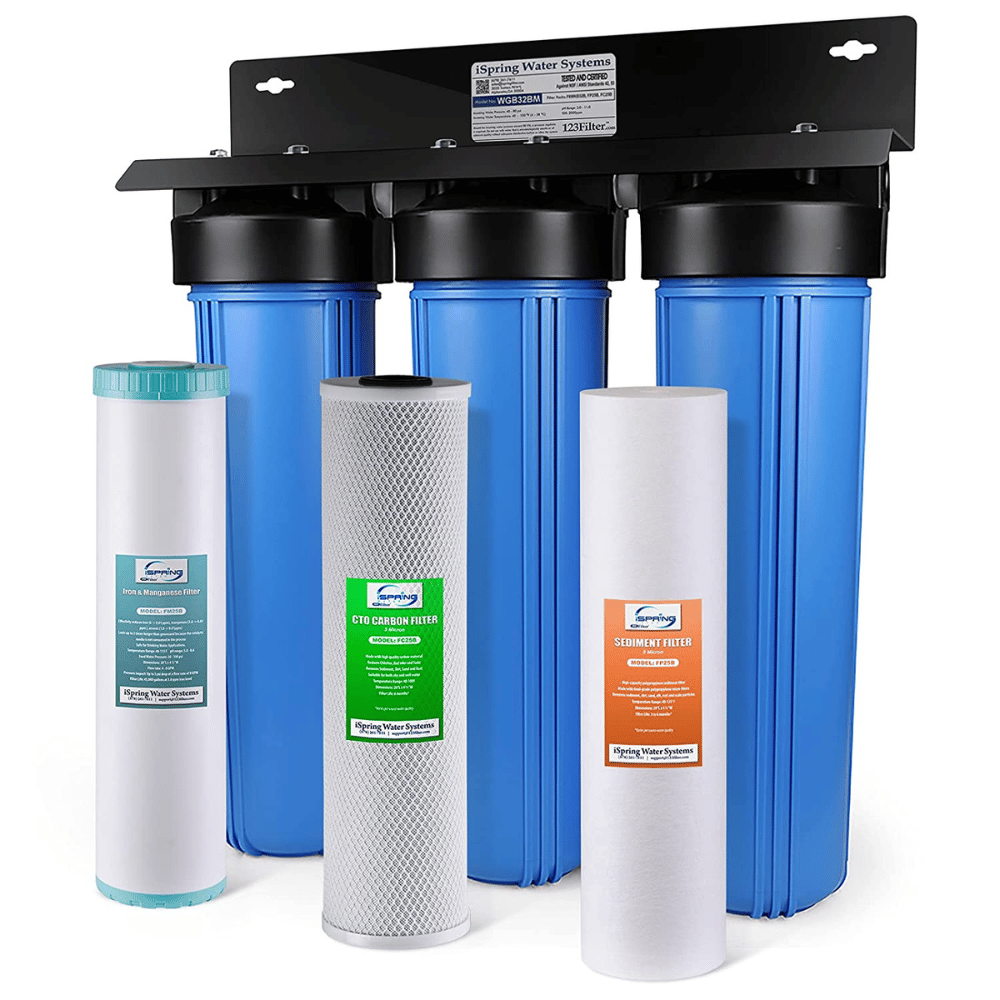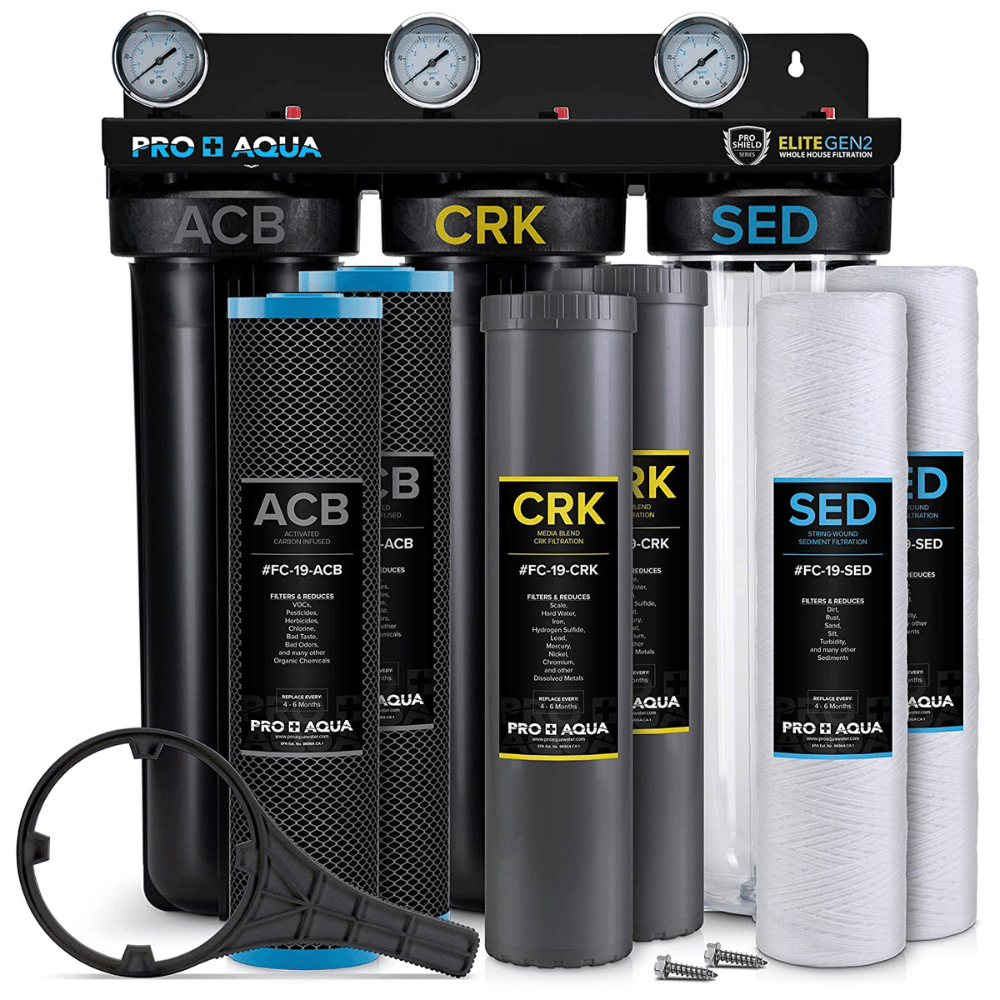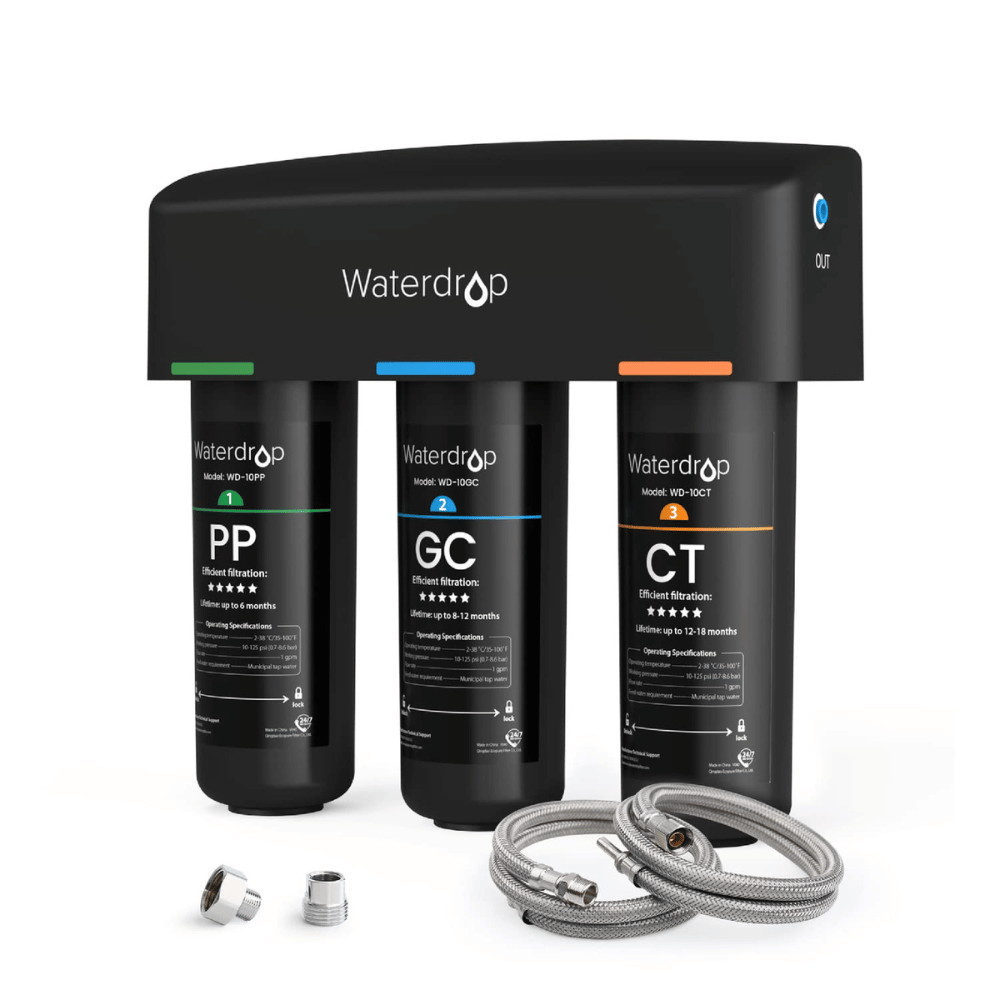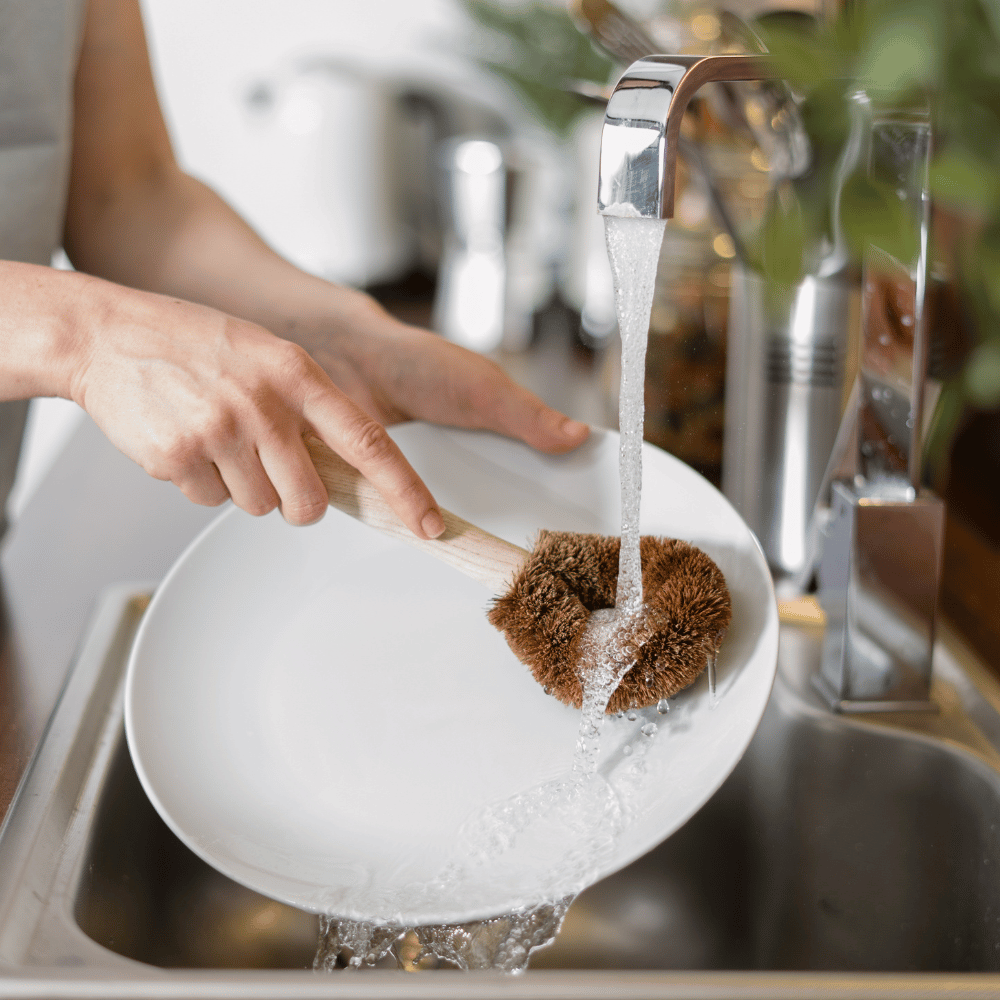Now, for those of you who rely on well water, we know it can be a bit of a wild ride. Sure, there's a certain charm in having your very own water source, but let's face it, well water can sometimes be a mixed bag. It's like a box of chocolates, as Forrest Gump would say – you never know what you're gonna get.
From sediment to bacteria, and from chemicals to minerals, well water can harbor a whole host of uninvited guests. And while some of them may not pose any immediate health risks, we can all agree that no one wants to drink water that tastes like a rusty pipe or feels like you've just taken a gulp of liquid sandpaper.
That's where well water filtration systems come in. These marvelous inventions are designed to tackle your water woes head-on, transforming your H2O from a murky mess into a pristine, refreshing delight. So, buckle up and join us as we dive into the world of well water filtration systems and help you find the best filter for well water that'll elevate your water game to a whole new level!
Types of Well Water Contaminants
Well, well, well, it's time to talk about the unwanted party crashers that can turn your well water into a less-than-appealing beverage. Here's a rundown of the usual contaminants found in well water:
Sediment and turbidity
Imagine trying to enjoy a glass of water, only to discover that it's filled with tiny particles of dirt, sand, or silt. Gross, right? Sediment and turbidity give your water that unappetizing, cloudy appearance, making it seem like you're about to drink a mud pie instead of a refreshing beverage. Fortunately, sediment filters can help you give these pesky particles the boot.
Microorganisms
It's a microscopic world in there, folks! Bacteria, viruses, and parasites are just some of the tiny critters that can call your well water home. While many of them are harmless, there are a few bad apples (or should we say, bad microbes) that can make you sick. Fear not, for a trusty UV water disinfection system or a reliable filter with a small pore size can help you show these micro-villains the door.
Chemical contaminants
Ah, chemicals – they're everywhere, and your well water is no exception. From agricultural runoff to industrial waste, there's no shortage of sources for these unwelcome intruders. Pesticides, herbicides, and volatile organic compounds (VOCs) can all hitch a ride into your water, but a high-quality activated carbon filter can help you bid them adieu.
Heavy metals
No, we're not talking about your favorite rock bands here. Heavy metals like lead, arsenic, and mercury can make their way into your well water and cause some serious health problems if consumed over time. Luckily, you don't have to put up with these metallic marauders. A reverse osmosis system or a special filter designed to remove heavy metals can help you rock on without them.
Hard water minerals
If you've ever felt like you need an extra rinse after showering or noticed stubborn white spots on your dishes, you've likely experienced the joys of hard water. Minerals like calcium and magnesium can give your well water that chalky taste and leave a lasting impression on your appliances. But don't despair – a water softener can come to your rescue, transforming your hard water into a soft and silky delight.
Factors to Consider When Choosing a Filtration System for Well Water
So, you're ready to kick those contaminants to the curb and enjoy the crisp, clean well water you deserve. But how do you choose the perfect filtration system to suit your needs? Don't worry, we've got you covered. Here are the top factors to consider when embarking on your quest for the best well water filtration system:
Water quality and testing
You can't fight the enemy if you don't know who they are, right? So, the first step in choosing your filtration system is to get your well water tested. Think of it as a reconnaissance mission to identify the specific contaminants you're up against. Armed with this intel, you can choose the right filter or system to tackle your unique water woes.
Flow rate and capacity
Picture this: you've just installed your shiny new filtration system, but your water flow is reduced to a sad trickle. Not cool, right? To avoid this scenario, consider your household's water consumption and water pressure and choose a water system that can handle your flow rate needs. After all, no one wants to turn their morning shower into a slow-motion scene from a dramatic movie.
Space and installation requirements
Let's face it, not all of us have a sprawling basement or utility room to accommodate a massive filtration system. So, before you splurge on that top-of-the-line filter, make sure you have the space to house it. And while you're at it, consider the installation requirements – some systems may need a helping hand from a professional plumber, while others are a breeze for DIY enthusiasts.
Maintenance and filter replacement
Just like a car, your well water filtration system needs regular maintenance to stay in tip-top shape. Check the manufacturer's recommendations for filter replacements and maintenance schedules. Remember, a system that's easy to maintain will save you time, effort, and potentially even some hair-pulling moments down the line.
Budget and long-term costs
We all know that the best things in life aren't always free, and that includes well water filtration systems. While it's tempting to go for the cheapest option, it's essential to consider the long-term costs, such as filter replacements and maintenance. Sometimes, it's worth investing a bit more upfront to save money (and headaches) in the long run.
Types of Well Water Filtration Systems
Alright, folks, it's time to meet the contenders in the battle against well water contaminants. Each one of these filtration systems has its own set of skills and specialties to help you achieve H2O nirvana. Let's get acquainted with them, shall we?
Sediment filters
This filter media is the bouncers of the well water filtration world. These tough guys are all about keeping out the riffraff – in this case, sediment, dirt, and silt. These filters come in various pore sizes and materials to catch those pesky particles and prevent them from crashing your water party. If your water has a touch of the "muddy puddle" vibe, a sediment filter is a must-have.
Activated carbon filters
These filters are like the charming socialites of the filtration world. They're excellent at attracting and trapping chemical contaminants, chlorine, and even some funky odors and tastes. The secret to their success? Activated carbon, which is like a magnet for impurities. If your water has a hint of eau de swimming pool or a strange aftertaste, an activated carbon filter can work wonders.
Reverse osmosis systems
Ever wished you had a superhero on your side in the fight against water contaminants? Well, look no further than the mighty reverse osmosis (RO) systems. These powerful units use a semipermeable membrane to separate the bad guys (contaminants) from the good guys (clean water), sending the latter straight to your faucet. They're especially great at tackling heavy metals, salt, and other dissolved solids. Just keep in mind that they may require more space and generate some wastewater in the process.
Ultraviolet (UV) disinfection systems
Behold the power of light! These high-tech systems use UV rays to zap bacteria, viruses, and other microorganisms into oblivion. If you're concerned about waterborne illnesses or just want an extra layer of protection against tiny troublemakers, a UV filter system is an excellent choice. But remember, they're specialists – they won't help with sediment, chemicals, or other non-living contaminants.
Ion exchange systems (water softeners)
Tired of your well water leaving you feeling like you've showered in liquid chalk? Enter the ion exchange system, also known as a water softener. These clever contraptions swap out hard water minerals like calcium and magnesium for sodium ions, giving you soft, silky water that's a dream to use. Your skin, hair, and appliances will thank you.
How We Choose the Best Water Filter for Well Water
You might be wondering how we, the valiant water crusaders, go about selecting the best well water filters to recommend to our fellow H2O enthusiasts. Fear not, for we have a top-secret, tried-and-true method for uncovering the finest filtration systems in all the land (or, you know, just really good research skills). Here's a peek behind the curtain at our process:
Expert Opinions and User Reviews: First, we scour the vast landscape of the internet, seeking the wisdom of well water filtration gurus, professionals, and everyday users just like you. By gathering their insights, experiences, and tales of triumph (or woe), we can identify the filters that truly stand out from the pack.
Filter Performance: Next, we dive deep into the nitty-gritty details of each filter's performance, examining their prowess at vanquishing contaminants and leaving behind only the freshest, cleanest water. After all, what good is a filter if it can't do its one job – filtering?
Ease of Use and Maintenance: No one wants to wrestle with a complicated filtration system that requires an advanced degree in engineering to operate or maintain. We consider ease of use, installation, and maintenance when selecting the best filters, ensuring that you won't need to call in a team of experts just to change a filter cartridge.
Bang for Your Buck: As much as we'd love to recommend only the fanciest, most expensive filtration systems, we understand that not everyone's budget stretches to infinity and beyond. We strive to find filters that offer the perfect balance of performance, reliability, and affordability, so you can enjoy crystal clear water without breaking the bank.
The X-Factor: Finally, we look for that special something – the je ne sais quoi that sets a filter apart from its peers. It could be a unique feature, a particularly stylish design, or a reputation for exceptional durability. Whatever it is, it makes the filter shine like a beacon of hope in a sea of mediocre water treatment options.
By combining all these factors, we carefully curate a list of the best well water filters that are truly worthy of your consideration. No stone is left unturned, no filter left unscrutinized, in our quest to bring you the finest options for transforming your well water into liquid gold (not literally, of course – that would be quite a mess!).
Bluevua Reverse Osmosis System Countertop Water Filter

Bluevua RO100ROPOT Reverse Osmosis System Countertop Water Filter, 4 Stage Purification, Counter RO Filtration, 2:1 Pure to Drain, Purified Tap Water, Portable Water Purifier for Home
Why We Love It
Let's face it, not everyone is a DIY plumbing whiz or has the luxury of a sprawling kitchen with unlimited space. That's where the Bluevua RO100ROPOT Reverse Osmosis System Countertop Water Filter swoops in to save the day. This little beauty delivers top-notch filtration without the hassle of installation or the need for a degree in plumbing. Just plug it in, fill it up, and watch as it transforms your tap water into a crystal-clear oasis of refreshment. Plus, the high borosilicate glass carafe is a fancy touch that keeps things classy and plastic-free.
Pros and Cons
Pros:
- Countertop design means no plumbing or installation required
- Premium-quality high borosilicate glass carafe for a touch of elegance and reduced risk of secondary pollution
- Power-saving standby mode keeps energy consumption in check
- Water-saving design repurposes leftover water for other household uses
- 4-stage filtration ensures 99.9% of contaminants are banished
- Long-lasting filters with a 12-24 month lifespan and a 2:1 Pure to Drain ratio
- Filter life monitor keeps you in the loop for timely replacements
- 1-year warranty and responsive technical support have your back
Cons:
- Requires a power source, so you'll need to be mindful of outlet availability
- Not suitable for those who prefer a built-in, under-the-sink filtration system
- Glass carafe may not be as durable as plastic alternatives
iSpring Whole House Water Filter System

iSpring Whole House Water Filter System w/Sediment, Carbon, and Iron & Manganese Reducing Water Filters, 3-Stage Iron Filter Whole House, Model: WGB32BM
Why We Love It
When it comes to protecting your family and home from a smorgasbord of waterborne villains, the iSpring Whole House Water Filter System is like having a superhero on standby 24/7. This powerful filtration system tackles everything from iron and manganese to sediment, chlorine, and more – all without breaking a sweat. And with easy DIY installation, you can leave the plumber's tools gathering dust in the garage. Plus, the high-quality filters and top-notch construction mean you'll be enjoying clean, crisp water for years to come.
Pros and Cons
Pros:
- Iron and manganese removal keeps your water free of pesky metal contaminants
- DIY installation and maintenance save you time, money, and a few gray hairs
- 1-inch NPT inlet/outlet and 20-inch x 4.5-inch cartridges ensure minimal impact on water flow
- High-quality filters tested by an independent third-party for NSF/ANSI compliance
- 100,000 gallons of water filter capacity keeps a family of four swimming in clean water for a full year
- 1-year manufacturer warranty and life-time free tech support for peace of mind
- Retains healthy minerals in your water, unlike reverse osmosis systems
Cons:
- Doesn't reduce Total Dissolved Solids (TDS), so not suitable for those seeking TDS removal
- Requires space for installation at the main water supply line
- Some users may prefer an under-the-sink or countertop filtration system
PRO+AQUA Elite Series GEN2 3-Stage Whole House Water Filtration System

PRO+AQUA Elite Series GEN2 PRO-100-E 3-Stage Whole House Water Filtration System for City and Well Water with Pressure Gauges, Removes 99% of Chlorine, VOCs, Odors & Contaminants, 1” Ports
Why We Love It
Whether you're on a quest for the purest water to grace your taste buds or simply want to keep your home's H2O free of unwanted nasties, the PRO+AQUA Elite Series GEN2 PRO-100-E 3-Stage Whole House filter system has your back. With its professional-grade design, this filtration marvel caters to small-to-medium households, handling well and city water like a boss. Plus, it's delightfully low-maintenance, ditching the need for draining, backwashing, or that pesky electricity stuff. And with its sleek, clear housings, you can keep a watchful eye on your filters like the water guardian you are.
Pros and Cons
Pros:
- Suitable for both well water and city water in small to medium households
- No need for regeneration, backwash, draining, or electricity – huzzah!
- Filter Stage 1: sediment filter captures rust, dust, silt, and dirt in a clear housing for easy monitoring
- Filter Stage 2: CRK filter reduces heavy metals, odors, and helps inhibit bacteria and algae growth
- Filter Stage 3: activated coconut shell carbon filter removes chlorine, VOCs, pesticides, and more
- Stainless steel pressure gauges make it a breeze to monitor system performance
- Low-maintenance design ensures easy upkeep and optimal filtration
Cons:
- May not be suitable for larger households with more than three bathrooms
- Some users may prefer a multi-stage filtration system with more specialized filters
- Filter replacement every 6 months may not be ideal for those seeking longer filter life
Express Water - 3-Stage Whole House Well Water Filtration System

Express Water Heavy Metal Whole House Water Filter – 3 Stage Whole House Water Filtration System – Sediment, KDF, Carbon Filters – Includes Pressure Gauges, Easy Release, and 1” Inch Connections
Why We Love It
If you're on the lookout for a water filter that kicks heavy metals and impurities to the curb like a bouncer at a rowdy nightclub, look no further than the Express Water Heavy Metal Whole House Water Filter. With 3 filtration stages, this whole house filtration system goes to town on over 80 different impurities, leaving you with water that's as clean and refreshing as a dip in the Fountain of Youth. With easy-to-install 1-inch standard connections and quick replacement cartridges, you'll spend less time wrestling with plumbing and more time sipping on the healthiest water on Earth. And with its sturdy stainless-steel frame, this filtration system is built to last, just like your favorite superhero.
Pros and Cons
Pros:
- Reduces harmful impurities and heavy metals from your entire home's water supply
- Tackles over 80 different impurities for the cleanest, healthiest water possible
- Easy-to-install 1-inch standard connections for a hassle-free setup
- Quick and easy cartridge replacement keeps your system running smoothly
- Sturdy stainless-steel frame for long-term durability and quality
- On-demand support from experts to answer any questions about your new water filter
- 1-year warranty for peace of mind
Cons:
- May not target certain contaminants that require more specialized filtration systems
- Some users may prefer an under-the-sink or countertop filtration system
- Filter replacement frequency may not be ideal for those seeking longer-lasting filters
Waterdrop TSA 3-Stage Under Sink Water Filter System

Waterdrop TSA 3-Stage Under Sink Water Filter, Water Filtration System Under Sink System, Direct Connect to Home Faucet, NSF/ANSI 42 Certified Element, USA Tech
Why We Love It
Ever wish you could just wave a magic wand and transform your tap water into a refreshing, pure oasis of hydration? Well, the Waterdrop TSA 3-Stage Under Sink Water Filter System may not be a magic wand, but it's pretty darn close. With its 8-stage deep filtration, this wizardly system banishes impurities like rust, chlorine, lead, and heavy metals faster than you can say "hocus pocus." Plus, with its upgraded design and strong, age-resistant materials, you won't have to worry about leaks and cracks crashing your hydration party. And with an impressive lifespan of up to 18 months, you'll save a ton of dough compared to buying bottled water. Abracadabra, indeed!
Pros and Cons
Pros:
- 8-stage deep filtration reduces a wide range of impurities for pure, healthy water
- Strong, age-resistant materials prevent leaks and cracks
- Filters have a long lifespan of up to 18 months, saving you money on replacements
- Simple 3-minute installation and 3-second filter replacement with a twist-and-lock design
- Compatible with both 3/8" and 1/2" cold water tubes
- 24/7 technical support for any product-related concerns
- Retains minerals for added health benefits, though it does not reduce TDS
Cons:
- May not target some contaminants requiring specialized filtration systems
- Some users might prefer a whole-house filtration system
- Carbon block made from natural coconut shells may cause allergies for some users
Tips for Maintaining Your Well Water Filtration System
Congratulations! You've chosen the perfect filtration system to send those pesky contaminants packing. But, as the wise Spider-Man once said, "With great power comes great responsibility." To keep your filtration system in peak condition and your well water tasting divine, follow these maintenance tips:
Regularly testing your water
Think of your well water as a mysterious, ever-changing potion. To stay one step ahead of those sneaky contaminants, make a habit of testing your water at least once a year. More frequent testing may be necessary if you notice changes in taste, odor, or appearance. Remember, knowledge is power – and the key to keeping your H2O in tip-top shape.
Timely filter replacements
Your filters are like the unsung heroes of your well water filtration system, working tirelessly to keep your water clean and clear. But even heroes need a break sometimes. To ensure your filters stay effective, replace them according to the manufacturer's recommendations. Think of it as giving your filters a well-deserved vacation, so they can return refreshed and ready to kick some contaminant butt.
Inspecting and cleaning system components
A little TLC goes a long way when it comes to maintaining your filtration system. Regularly inspect and clean system components to prevent buildup, clogs, or other issues. After all, a happy filtration system is a well-functioning one. So, show your system some love, and it'll love you back with years of clean, delicious water.
Monitoring for changes in water quality or system performance
Keep a keen eye (and nose, and taste buds) on your well water for any changes in quality or system performance. If you notice anything amiss (e.g reduced water flow rate), it could be a sign that your filtration system needs some attention. By staying vigilant, you'll be able to catch any issues early and keep your H2O flowing crystal clear.
Seeking professional assistance when needed
Sometimes, even the most seasoned water warriors need a helping hand. If you're unsure about any aspect of your filtration system or face a problem that's beyond your expertise, don't be afraid to call in the pros. A skilled plumber or water treatment expert can help you troubleshoot, diagnose, and resolve any issues, so you can get back to enjoying your pristine well water.
FAQ Section: Frequently Asked Questions About Well Water Filtration Systems
Are you looking for the ultimate well water filtration system but have a ton of questions bouncing around your brain? Don't worry, we've got you covered! We've compiled a list of the most frequently asked questions (and their answers) to help guide you through the mysterious world of well water filtration. So grab a comfy seat, relax, and let's get started on this knowledge-packed journey.
What are the main contaminants in well water?
Well water can contain a variety of contaminants, such as sediment, microorganisms (bacteria, viruses, and parasites), chemical contaminants (pesticides and herbicides), heavy metals (lead, mercury, and arsenic), and hard water minerals (calcium and magnesium). These contaminants can affect the taste, smell, and appearance of your water and may pose health risks if not properly addressed.
How do I test my well water for contaminants?
To test your well water for contaminants, you can use a water test kit or contact a certified laboratory to perform a comprehensive water analysis. These tests typically check for bacteria, nitrates, heavy metals, and other common contaminants. Regular testing is essential to ensure your water remains safe to drink and use.
What is the difference between point-of-use (POU) and point-of-entry (POE) filtration systems?
Point-of-use (POU) filtration systems are installed at specific locations, such as under your kitchen sink or at your showerhead, to filter water for drinking, cooking, or bathing. Point-of-entry (POE) filtration systems, also known as whole-house filtration systems, are installed at the main water line and treat all the water entering your home. POU systems usually target specific contaminants, while POE systems provide a more comprehensive solution for your entire home.
How often should I replace my well water filters?
The frequency at which you should replace your well water filters depends on the type of filter and the manufacturer's recommendations. Typically, sediment filters should be replaced every 3-6 months, while activated carbon filters may last up to 12 months. Reverse osmosis membranes and ion exchange resins can last 2-3 years. You many need to replace the filters if you notice a drop in water pressure or the taste and smell of the water has changed. Always refer to the manufacturer's guidelines for specific replacement schedules.
Do well water filtration systems remove essential minerals?
Some well water filtration systems, such as reverse osmosis systems, do remove essential minerals like calcium and magnesium. However, other systems like activated carbon filters and sediment filters retain these beneficial minerals. If you're concerned about mineral loss, consider a system that preserves minerals or invest in a remineralization cartridge to add them back into your water.
Can well water filtration systems remove bacteria and viruses?
While some filtration systems, like activated carbon block filters, can reduce bacteria to a certain extent, ultraviolet (UV) disinfection systems are specifically designed to inactivate bacteria, viruses, and parasites. These systems use UV light to destroy the DNA of microorganisms, rendering them harmless. UV systems are often used in combination with other filtration methods for comprehensive water treatment and clean drinking water.
How much maintenance do well water filtration systems require?
Maintenance requirements for well water filtration systems vary depending on the system type and usage. Regular maintenance tasks include changing filters, cleaning system components, monitoring water quality, and inspecting for leaks or performance issues. Always follow the manufacturer's recommendations for proper maintenance to keep your system running efficiently.
What are the costs associated with well water filtration systems?
The costs associated with well water filtration systems can vary widely depending on the system type, installation, filter replacements, and maintenance requirements. Initial costs can range from a few hundred dollars for basic systems to several thousand dollars for more advanced whole-house water filtration systems. Keep in mind that ongoing maintenance costs, such as filter replacements, can add up over time. When selecting a system, consider both the upfront and long-term costs to ensure you're making a sound investment.
How can I determine the best well water filtration system for my needs?
To determine the best well water filtration system for your needs, start by testing your water to identify the specific contaminants present. Next, consider factors such as your water usage, the number of people in your household, your budget, and any space or installation requirements. Finally, research the different types of filtration systems available and choose one that effectively addresses your water quality issues and meets your other criteria. Consult with a professional or seek recommendations from friends and online reviews to help you make an informed decision.
Conclusion
In conclusion, clean and safe drinking water is essential for maintaining a healthy lifestyle, and investing in the best well water filtration system is a smart move for homeowners. With numerous contaminants potentially lurking in your well water, it's crucial to find a system that effectively addresses your specific water quality issues. By understanding the different types of contaminants, filtration systems, and factors to consider when choosing a system, you can make an informed decision and provide your family with the highest quality water possible.
Remember, regular testing, maintenance, and filter replacements are key to ensuring optimal system performance and the continued safety of your water. Don't hesitate to seek professional help if you have questions or concerns about your well water filtration system. Cheers to better-tasting, safer, and cleaner water for you and your loved ones!






